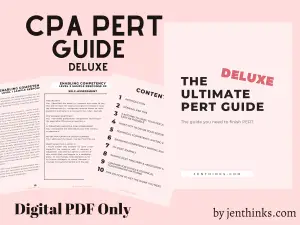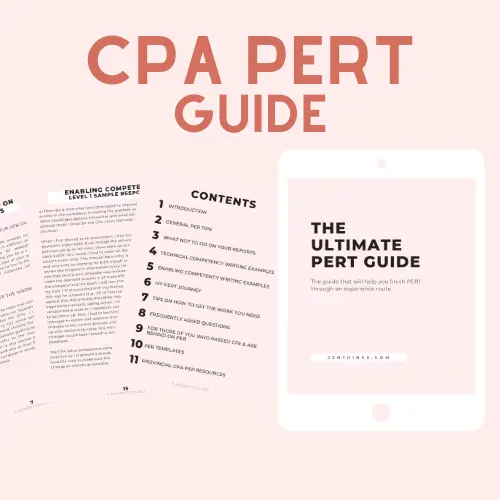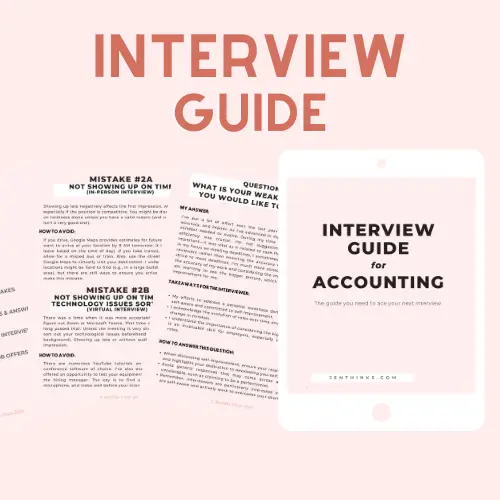If you have been following me for a while, you would know that I am an avid planner. I had an idea of when I will be designated before I even started taking the PREP-equivalent courses in college (I was working full-time then because I got a Psychology degree in university first). I rarely go into anything without a plan (which is a flaw at times because I am not a risk-taker) or an assessment of risks first. Therefore, it was natural for me to plan out my CPA PERT route. I am sharing my planning process with you and hopefully you will be able to do the same. Note, at the time of writing this, I work in the industry as a Corporate Accountant.
Read all CPA PERT posts here.
Why Do You Need To Plan For CPA PERT?
If you have planned before or are an avid planner like me, you probably know that plan changes all the time. That is fine and you must accept that it is the reality. However, having a flexible yet focused plan allows you to adapt and respond to disruption and changes quickly. In the PERT sense, it allows you to find back up work if you don’t end up getting to be involved in whatever you planned on doing for a specific technical competency (e.g., budgeting for management accounting).
If you have already seen the CPA competency requirements for PERT before, you are probably aware of how specific and vague the requirements are at the same time. Candidates sometimes get frustrated because of how vague the instructions are but at the same time, these same instructions allow flexibility for whatever industry/position we work in.
You Have Convinced Me, So, Tell Me How To Plan
Supportive Manager &/Or CPA Mentor
I am going to start this off by telling you that a supportive manager and/or mentor is one of the key ingredients to success. Does that mean you are out of luck if you didn’t? No. That simply means you need to be even more prepared and proactive on your own. I have been lucky in the sense that both my previous and current mentors are competent, dedicated and helpful. However, I know some of you out there who aren’t so lucky. If that is the case, I want to first ask youself if you are where you want to be for the next year or so? I understand not everyone is lucky enough to have a choice but at the same time, it is absolutely fair for us to expect a certain level of support from our employers. I have always reported to someone and have someone reporting to me (briefly) and I knew the positive impact a helpful and caring manager can have on performance.
RELATED POST – My CPA Journey – How Do I Know If It Is Okay To Quit?
I changed job last year and due to timing, my designation timeline was postponed by a few months. However, I evaluated and decided that it was worth the change. Therefore, ask yourself if you are where you want to be. The PERT via EVR route is difficult even with support so it is important that you are conscious of where you are.
A Clear Roadmap of What You Need for Technical Competencies
You are probably already aware of the Core, Depth and Breadth requirements for technical competencies. However, do you already know which technical competencies you need? For example, my most recent plan (if you ask me, this is probably version 15) includes the following:
- Audit and Assurance – Internal Control (L2)
- Financial Reporting – All Four (2 x L1, 2 x L2)
- Management Accounting – Organization/Individual Performance (L1); Measurement and Planning, Budgeting and Forecasting (L1)
- Taxation – Tax Compliance: Corporate or Personal (L2)
RELATED POST – CPA PERT – Technical Competencies Examples
As you can tell, my plan with 8 competencies satisfies Core, Depth and Breadth. In the next section, I will share how I came up with what I need (definitely required more than simply picking what I am most interested in).
Are you looking for a comprehensive guide for PERT with example Level 1 & 2 full responses, tips, templates and more? Check out my CPA PERT Guides!
The Planning Meeting Tailored To You
I know many of you are appreciative of the technical competency examples I have shared in the past. However, the reality is my examples might not be applicable to all of you. I still shared because I hope to inspire you to think of something similar or come up with tasks you can do at your job that would satisfy the requirements.
When I started my new job last year, I had to revise my CPA PERT plan completely because of the new responsibilities and complexity. My new job had more complex tasks that I didn’t have a chance to work on as an AP Team Lead (e.g., balance sheet item reconciliations). At the same time, I lost the opportunity to prepare a more complex section for financial statements due to my company structure. Therefore, I spent the first 3 months basically learning about who is responsible for what. For example, there is a much higher chance I can take on tasks that my manager currently handles over tasks that his manager currently takes care of. I also reviewed the technical competencies a number of times in the same time period to come up with a list of tasks I think I can work on/ask my manager for a chance to work on.
I then set a meeting with my manager who is also my mentor to go over my plan. Note, there are a few things you need to do in order to make this as easy as possible for your manager:
- initiate the meeting with a lot of time in advance and avoid setting a time during accounting close when everyone is busy
- attend the meeting with a list of tasks and corresponding technical competencies prepared; I also prepared 2 extra tasks as back up
- make sure you take notes on his/her feedback and timeline for the tasks – for me, my manager/mentor prefers I remind him as we get closer to the time the task is available in case he forgets (e.g., only one chance per quarter to prepare quarterly analytics) and takes care of it himself
Then, More CPA PERT Planning
The work definitely doesn’t stop once you have your plan together. It is just the beginning. In order for the plan to succeed, you need to do the following:
- make note of when you will be doing the tasks (e.g., quarterly budgeting, financial statement analysis) and how often
- because CPA values progression, make sure you keep that in mind and continually challenge yourself to take on the more complex version of the task (e.g., start by analyzing variance on the balance sheet this quarter before analyzing variance on the income statement as well next quarter)
- write up your report at least once a month because it is 10x easier when the memory is fresh (no need to submit for review every month but it is strongly encouraged you keep the report as current as you could)
- be ready to adapt and respond if a task is no longer available or there is a job/position change
- have a dedicated place (e.g., Google sheets, a note pad, a bullet journal) for you to write down a quick note whenever you think of a task that you can report for PERT
- this has happened to me many times when I was working, studying or just thinking so keep this in mind
Okay, I Know What To Do With Technical Competencies; What About Enabling Competencies?
You know the dedicated place I asked you to come up with for quick notes? That is the perfect place for enabling competencies as well. If you haven’t familiarized yourself with the five enabling competencies, you should review the CPA Practical Experience’s Appendix B. All candidates are required to reach level two for all five of them. Since they are more scenario-based and reflective than technical competencies, they are harder to plan than technical competency. Therefore, it is crucial for you to be familiar with the five competencies and be alert at work when an applicable situation arises.
For example, one of the enabling competencies is titled “Solving Problems and Adding Value.” The complexity and scope might vary but an AR clerk and a controller both solve problems for the company. For example, an AR clerk could have been involved in figuring out a strategy to reach customers for collection when the whole world switched to work from home and landline phones were no longer in use. If you are familiar with the criteria of the enabling competencies, you will be able to make a note as soon as this opportunity presents itself.
We don’t need to wait until we get our letters to offer value and that is certainly the point of developing our enabling competencies on our journey.
Remember This – It Will Be Worth It At The End
Even though the CPA PERT journey is hard (as is the rest of the CPA journey), it is the CPA’s way of upholding the value for the designation. If you have made it as far as you have, you must know the value of the 3 letters behind your name. The work we have to do for PERT holds us accountable for our careers, our paths and our successes. It continually challenges us to go the extra mile at work in order to show competency and progression.
It might not be evident now but when this is over, you will be proud of what you have achieved.



